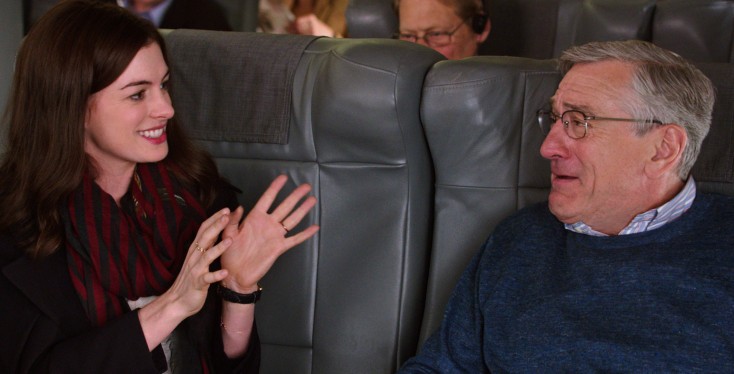
Anne Hathaway stars as Jules Ostin in THE INTERN. ©Warner Bros. Entertainment / Ratpac-Dune Entertainment LLC. CR: Francois Duhamel.
By ANGELA DAWSON
Front Row Features
HOLLYWOOD—Only a few years ago, Anne Hathaway played a young assistant to a grumpy and fearsome magazine boss in “The Devil Wears Prada.” Now, the Oscar-winning actress (“Les Miserables”) plays the top dog at a successful fashion-based e-commerce company, where she employs a 70-year-old widower (fellow Oscar winner Robert De Niro) as an intern. As Jules, Hathaway is smart and attractive, and yet she has few close relationships and colleagues she can depend on. With his wisdom and experience, De Niro’s Ben soon begins to fill the void in his boss’ life.
“The Intern,” as the comedy is called, is directed by Nancy Meyers, who has directed other A-listers including Meryl Streep and Alec Baldwin in “It’s Complicated,” Cameron Diaz in “The Holiday” and Mel Gibson in “What Women Want.”
Married to actor Adam Shulman since 2012, Hathaway most recently starred in the space drama “Interstellar.”
The 32-year-old actress spoke about playing a high-powered CEO, working with De Niro and Meyers and overcoming insecurities.
Q: What issues would you say are addressed in “The Intern?”
Hathaway: Age and gender. One of the things that Nancy (Meyers, the director) has done in this movie and that she has done throughout her career is find things that we relate to via humor, emotion and just throughout our lives. She usually has a knack for getting there first and making observations. In this case, I think the observations she has made are about generational humor. She really has her finger on the pulse and gotten there before other people. This is something I love about the movie. I feel that I can see this movie with any of my friends. I have friends who are 20 and friends who are83 years old, and I can see it with any of them. I would love to see this movie with my parents. I don’t think we have had a movie like this in a long time where we can appeal to everyone specifically of every age where they can find humor in it, whatever age they are.
Q: Do you see this movie as a love letter to Baby Boomers? Are you suggesting it’s lonely for women at the top and do you see this particularly for successful women, wherever they are in society?
Hathaway: I thought it was not because of a gender issue but just because I think Jules is a private person. She is so dedicated to her company and she dreads the idea that anything in her personal life could impact her ability to do her job and keep the company going. She does not really have anyone to confide in and then she meets Ben (De Niro’s character) and their friendship develops organically, and she ends up opening up to him and taking his advice because she really, really respects him because it’s really sound excellent advice. It is not forced and it happens organically so I just thought she was more isolated because of her position.
One of the things I love about the movie is that Jules has so much heart and she builds an incredible structure that may have bones but there is no connective tissue and nobody at the company knows how to build connective tissue and this is when Ben comes in and he figures out how to get everyone to connect together. I just love the observation that in this day and age where we have the tools for communication at our disposal where we are using them in such a way and not taking full advantage of them or maybe taking full advantage is not as effective as just having a one-on-one conversation.
Q: What experience have you had with some of your interns and how will this change going forward?
Hathaway: I don’t have an intern. I was on a photo shoot recently and I was greeted at the top of the day by an intern. Because of our movie, I went out of my way to pay her a little extra attention. I asked her questions about who she was, why she was doing this, where she wanted to go and then I thought I was doing something so nice. I told her I have a playlist so we can be in synergy but then I did not realize the sound system was impossible to work and every time she leaped from iPod to iPod it would create the most horrible screech and everybody hated it so I was trying to do a nice thing for the intern but I made everyone kind of annoyed.
Q: Can you speak about collaborating with (director) Nancy Meyers and what you think of her?
Hathaway: You look at Nancy and you see this tiny, adorable woman with awesome hair but at first glance I had no idea of the tenacious, uncompromising, inexhaustible, powerhouse that she is. I am so lucky I got to work with her on this. In terms of collaboration I admired her, but now that I made a movie with her, it’s beyond that.
When we started, we saw the character in two different ways and I wanted her to wear her stress more on her sleeve but Nancy wanted her to have it a little more together. I had this moment where I said, “Okay, we see it different ways and am I going to feel so uncomfortable the entire time if I am not following my instinct,” and then I thought to myself, “Who knows a Nancy Meyers character better than Nancy Meyers and these characters are beloved by you so trust her.”
It became a wonderful exercise of being guided through a character, which is very new for me. I felt like it was a true collaboration.
Q: In terms of the characters you’ve played, how much would you say that you enhanced or changed each other’s lives and how would you say this film speaks to two different audiences—young and old?
Hathaway: There is a joke that got cut from the movie, but it is my favorite. It is a scene where a character is over at Ben’s house and they are talking and he puts his beer on the coffee table. Ben looks down and says, “Why would you put your beer next to the coaster?” I just feel my generation laughs because we are really bad about using coasters and Boomers laugh because it is a legit question. I feel many of the jokes both ways are satisfying.
It took me a long time to crack Jules, as I kept looking for her deep dark secret but as it turns out she is really just a wonderful person. On the inside is the secret of her strength and this makes her a great boss, as she is a deeply decent and nice person. The reason the story is being told about her in that moment is that she is under unbelievable stress and she has everything she needs to navigate this moment except space and a compassionate ear.
What Ben brings into her life is a tremendous amount of compassion and I don’t know if it is a generational thing or what, but I feel there is a lot of judgment in the world, particularly when people are in a more-visible position like Jules would be as a CEO of a startup, where her business has grown so quickly. There is a lot of judgment for people in those positions and Ben does not judge her. He observes, opens her and gives her a safe space full of compassion and understanding and she thrives in this. He does this to a lot of people around him and they all thrive as a result.
It is a simple thing, but not something we see very often in our world and feel if it is something we could see more of and perhaps contribute to we would see positive results.
Q: What did you do to prepare for this deep friendship with Mr. De Niro’s character Ben, and why was it important for you to explore this dynamic?
Hathaway: Bob and I did some extreme bonding at the Century 21 Mall. It’s a funny thing as I just trusted everything would be okay, and we did not do anything special. Bob is an easy guy to get along with. He is incredibly Zen, calm and approachable. I could not talk around him for the first three weeks. I just felt like an idiot with everything I said. I just trusted the words. It did not matter how I felt as Jules felt comfortable around Ben and I just trusted this would carry us. Also Nancy would guide us and it worked. Also, I had a lot of film history on my side. Bob is good at having chemistry with people so I assumed as long as I did not mess this up we would be okay.
Q: What did you learn about yourself?
Hathaway: I cannot explain why it happened for me on this movie, if it was my character, a dynamic, or if just being around Bob’s Zen-like attitude, or what but I up until now have made my movies from a place of insecurity, neurosis and self-doubt but I just got tired of it and came from a more positive place. To feel good about what I was doing and embrace the unknown and not assuming that if I did not have a clear idea of how things went this would be bad and actually trust that the unknown could be good. I had a wonderful time making this movie and I think it yielded a more relaxed performance and I am proud of the work we did and what we created. As it turns out, you can make a movie with non-stop sleepless nights.





